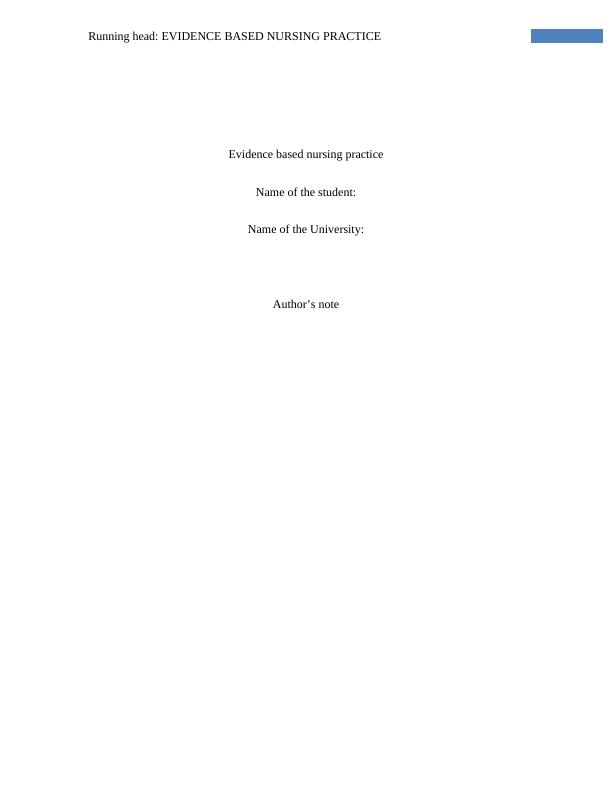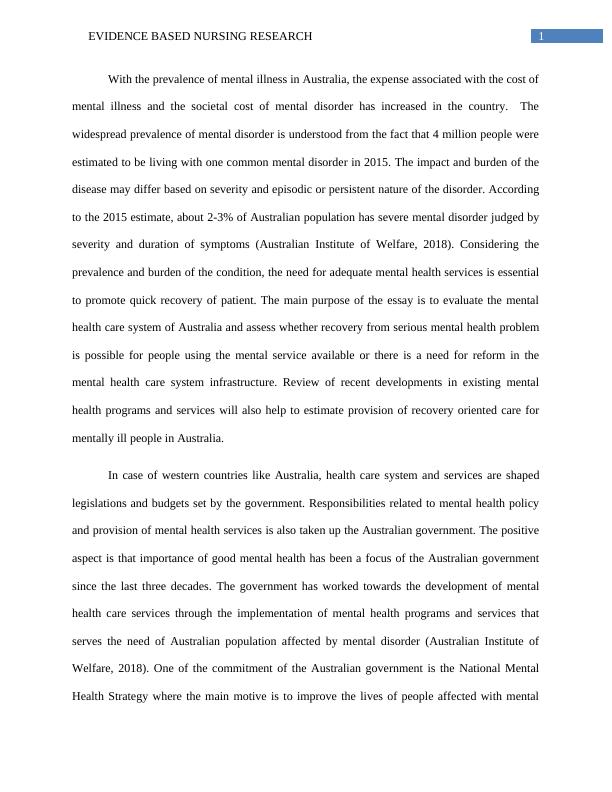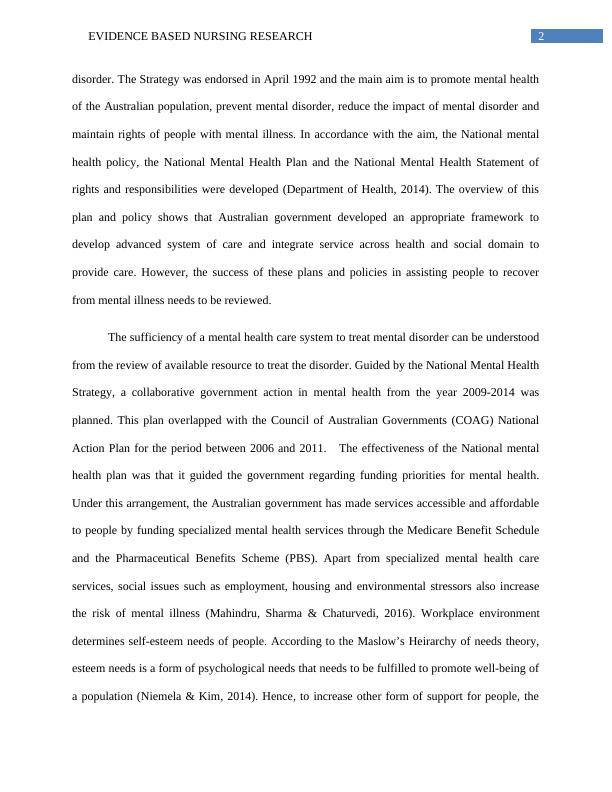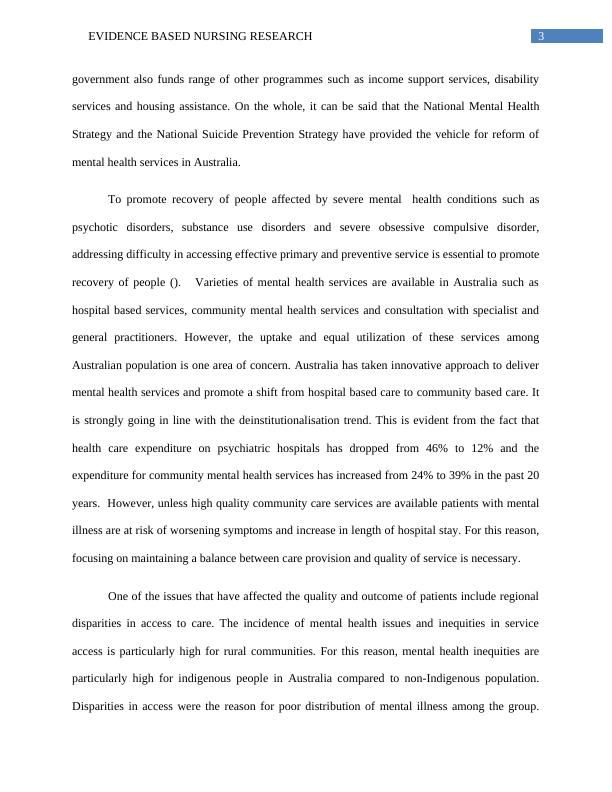Evaluation of Mental Health Care System in Australia: A Recovery Oriented Approach
Added on 2023-06-11
11 Pages2669 Words500 Views
Running head: EVIDENCE BASED NURSING PRACTICE
Evidence based nursing practice
Name of the student:
Name of the University:
Author’s note
Evidence based nursing practice
Name of the student:
Name of the University:
Author’s note

1EVIDENCE BASED NURSING RESEARCH
With the prevalence of mental illness in Australia, the expense associated with the cost of
mental illness and the societal cost of mental disorder has increased in the country. The
widespread prevalence of mental disorder is understood from the fact that 4 million people were
estimated to be living with one common mental disorder in 2015. The impact and burden of the
disease may differ based on severity and episodic or persistent nature of the disorder. According
to the 2015 estimate, about 2-3% of Australian population has severe mental disorder judged by
severity and duration of symptoms (Australian Institute of Welfare, 2018). Considering the
prevalence and burden of the condition, the need for adequate mental health services is essential
to promote quick recovery of patient. The main purpose of the essay is to evaluate the mental
health care system of Australia and assess whether recovery from serious mental health problem
is possible for people using the mental service available or there is a need for reform in the
mental health care system infrastructure. Review of recent developments in existing mental
health programs and services will also help to estimate provision of recovery oriented care for
mentally ill people in Australia.
In case of western countries like Australia, health care system and services are shaped
legislations and budgets set by the government. Responsibilities related to mental health policy
and provision of mental health services is also taken up the Australian government. The positive
aspect is that importance of good mental health has been a focus of the Australian government
since the last three decades. The government has worked towards the development of mental
health care services through the implementation of mental health programs and services that
serves the need of Australian population affected by mental disorder (Australian Institute of
Welfare, 2018). One of the commitment of the Australian government is the National Mental
Health Strategy where the main motive is to improve the lives of people affected with mental
With the prevalence of mental illness in Australia, the expense associated with the cost of
mental illness and the societal cost of mental disorder has increased in the country. The
widespread prevalence of mental disorder is understood from the fact that 4 million people were
estimated to be living with one common mental disorder in 2015. The impact and burden of the
disease may differ based on severity and episodic or persistent nature of the disorder. According
to the 2015 estimate, about 2-3% of Australian population has severe mental disorder judged by
severity and duration of symptoms (Australian Institute of Welfare, 2018). Considering the
prevalence and burden of the condition, the need for adequate mental health services is essential
to promote quick recovery of patient. The main purpose of the essay is to evaluate the mental
health care system of Australia and assess whether recovery from serious mental health problem
is possible for people using the mental service available or there is a need for reform in the
mental health care system infrastructure. Review of recent developments in existing mental
health programs and services will also help to estimate provision of recovery oriented care for
mentally ill people in Australia.
In case of western countries like Australia, health care system and services are shaped
legislations and budgets set by the government. Responsibilities related to mental health policy
and provision of mental health services is also taken up the Australian government. The positive
aspect is that importance of good mental health has been a focus of the Australian government
since the last three decades. The government has worked towards the development of mental
health care services through the implementation of mental health programs and services that
serves the need of Australian population affected by mental disorder (Australian Institute of
Welfare, 2018). One of the commitment of the Australian government is the National Mental
Health Strategy where the main motive is to improve the lives of people affected with mental

2EVIDENCE BASED NURSING RESEARCH
disorder. The Strategy was endorsed in April 1992 and the main aim is to promote mental health
of the Australian population, prevent mental disorder, reduce the impact of mental disorder and
maintain rights of people with mental illness. In accordance with the aim, the National mental
health policy, the National Mental Health Plan and the National Mental Health Statement of
rights and responsibilities were developed (Department of Health, 2014). The overview of this
plan and policy shows that Australian government developed an appropriate framework to
develop advanced system of care and integrate service across health and social domain to
provide care. However, the success of these plans and policies in assisting people to recover
from mental illness needs to be reviewed.
The sufficiency of a mental health care system to treat mental disorder can be understood
from the review of available resource to treat the disorder. Guided by the National Mental Health
Strategy, a collaborative government action in mental health from the year 2009-2014 was
planned. This plan overlapped with the Council of Australian Governments (COAG) National
Action Plan for the period between 2006 and 2011. The effectiveness of the National mental
health plan was that it guided the government regarding funding priorities for mental health.
Under this arrangement, the Australian government has made services accessible and affordable
to people by funding specialized mental health services through the Medicare Benefit Schedule
and the Pharmaceutical Benefits Scheme (PBS). Apart from specialized mental health care
services, social issues such as employment, housing and environmental stressors also increase
the risk of mental illness (Mahindru, Sharma & Chaturvedi, 2016). Workplace environment
determines self-esteem needs of people. According to the Maslow’s Heirarchy of needs theory,
esteem needs is a form of psychological needs that needs to be fulfilled to promote well-being of
a population (Niemela & Kim, 2014). Hence, to increase other form of support for people, the
disorder. The Strategy was endorsed in April 1992 and the main aim is to promote mental health
of the Australian population, prevent mental disorder, reduce the impact of mental disorder and
maintain rights of people with mental illness. In accordance with the aim, the National mental
health policy, the National Mental Health Plan and the National Mental Health Statement of
rights and responsibilities were developed (Department of Health, 2014). The overview of this
plan and policy shows that Australian government developed an appropriate framework to
develop advanced system of care and integrate service across health and social domain to
provide care. However, the success of these plans and policies in assisting people to recover
from mental illness needs to be reviewed.
The sufficiency of a mental health care system to treat mental disorder can be understood
from the review of available resource to treat the disorder. Guided by the National Mental Health
Strategy, a collaborative government action in mental health from the year 2009-2014 was
planned. This plan overlapped with the Council of Australian Governments (COAG) National
Action Plan for the period between 2006 and 2011. The effectiveness of the National mental
health plan was that it guided the government regarding funding priorities for mental health.
Under this arrangement, the Australian government has made services accessible and affordable
to people by funding specialized mental health services through the Medicare Benefit Schedule
and the Pharmaceutical Benefits Scheme (PBS). Apart from specialized mental health care
services, social issues such as employment, housing and environmental stressors also increase
the risk of mental illness (Mahindru, Sharma & Chaturvedi, 2016). Workplace environment
determines self-esteem needs of people. According to the Maslow’s Heirarchy of needs theory,
esteem needs is a form of psychological needs that needs to be fulfilled to promote well-being of
a population (Niemela & Kim, 2014). Hence, to increase other form of support for people, the

3EVIDENCE BASED NURSING RESEARCH
government also funds range of other programmes such as income support services, disability
services and housing assistance. On the whole, it can be said that the National Mental Health
Strategy and the National Suicide Prevention Strategy have provided the vehicle for reform of
mental health services in Australia.
To promote recovery of people affected by severe mental health conditions such as
psychotic disorders, substance use disorders and severe obsessive compulsive disorder,
addressing difficulty in accessing effective primary and preventive service is essential to promote
recovery of people (). Varieties of mental health services are available in Australia such as
hospital based services, community mental health services and consultation with specialist and
general practitioners. However, the uptake and equal utilization of these services among
Australian population is one area of concern. Australia has taken innovative approach to deliver
mental health services and promote a shift from hospital based care to community based care. It
is strongly going in line with the deinstitutionalisation trend. This is evident from the fact that
health care expenditure on psychiatric hospitals has dropped from 46% to 12% and the
expenditure for community mental health services has increased from 24% to 39% in the past 20
years. However, unless high quality community care services are available patients with mental
illness are at risk of worsening symptoms and increase in length of hospital stay. For this reason,
focusing on maintaining a balance between care provision and quality of service is necessary.
One of the issues that have affected the quality and outcome of patients include regional
disparities in access to care. The incidence of mental health issues and inequities in service
access is particularly high for rural communities. For this reason, mental health inequities are
particularly high for indigenous people in Australia compared to non-Indigenous population.
Disparities in access were the reason for poor distribution of mental illness among the group.
government also funds range of other programmes such as income support services, disability
services and housing assistance. On the whole, it can be said that the National Mental Health
Strategy and the National Suicide Prevention Strategy have provided the vehicle for reform of
mental health services in Australia.
To promote recovery of people affected by severe mental health conditions such as
psychotic disorders, substance use disorders and severe obsessive compulsive disorder,
addressing difficulty in accessing effective primary and preventive service is essential to promote
recovery of people (). Varieties of mental health services are available in Australia such as
hospital based services, community mental health services and consultation with specialist and
general practitioners. However, the uptake and equal utilization of these services among
Australian population is one area of concern. Australia has taken innovative approach to deliver
mental health services and promote a shift from hospital based care to community based care. It
is strongly going in line with the deinstitutionalisation trend. This is evident from the fact that
health care expenditure on psychiatric hospitals has dropped from 46% to 12% and the
expenditure for community mental health services has increased from 24% to 39% in the past 20
years. However, unless high quality community care services are available patients with mental
illness are at risk of worsening symptoms and increase in length of hospital stay. For this reason,
focusing on maintaining a balance between care provision and quality of service is necessary.
One of the issues that have affected the quality and outcome of patients include regional
disparities in access to care. The incidence of mental health issues and inequities in service
access is particularly high for rural communities. For this reason, mental health inequities are
particularly high for indigenous people in Australia compared to non-Indigenous population.
Disparities in access were the reason for poor distribution of mental illness among the group.

End of preview
Want to access all the pages? Upload your documents or become a member.
Related Documents
Insight into Mental Health Patients: Recovery-Oriented Practice, NSW Mental Health Act, Least Restrictive Practice, and Nursing Interventionslg...
|16
|4757
|212
Effectiveness of Mindfulness Based Therapy in Reducing Depression and Suicide Ideation in Military Veteranslg...
|26
|6308
|86
Mental Health and Social Healthlg...
|9
|1696
|307
Comparing Economic Policies of Mental Health Promotion in US and Australialg...
|11
|2932
|187
Health Care Delivery Methods in Dementia and Impact of Povertylg...
|11
|2841
|165
Social Policy on Mental Health in Australia | Assignmentlg...
|9
|2548
|164
